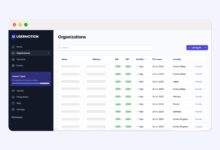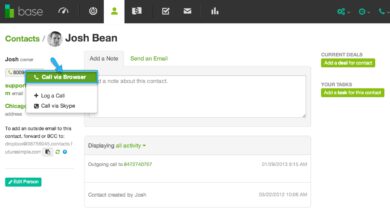CRM Base de Donnee: 7 Powerful Insights for Ultimate Success
Ever wondered how top companies manage customer relationships so seamlessly? The secret often lies in a solid CRM base de donnee—your ultimate tool for smarter, data-driven decisions.
Understanding CRM Base de Donnee: The Core of Modern Customer Management

A CRM base de donnee, or customer relationship management database, is the backbone of any effective CRM system. It’s where all customer interactions, preferences, transaction histories, and communication logs are stored, organized, and made accessible for analysis and action. This centralized data repository enables businesses to deliver personalized experiences, improve customer satisfaction, and drive sales growth.
What Is a CRM Base de Donnee?
At its core, a CRM base de donnee is a structured collection of customer information. Unlike traditional spreadsheets or siloed files, this database integrates data from multiple touchpoints—emails, phone calls, social media, website visits, and purchase records—into a unified system. This integration allows teams across sales, marketing, and customer service to access real-time insights and collaborate more effectively.
- Stores contact details, interaction history, and behavioral data
- Supports automation of marketing and sales workflows
- Enables segmentation and personalization at scale
The power of a CRM base de donnee lies not just in storage but in its ability to transform raw data into actionable intelligence. For example, Salesforce, one of the leading CRM platforms, leverages its database to provide predictive analytics and AI-driven recommendations that help sales reps prioritize leads. You can learn more about Salesforce’s approach here.
How CRM Base de Donnee Differs from Traditional Databases
While all CRM systems rely on databases, not all databases are designed for CRM purposes. A standard database might store customer names and addresses, but a CRM base de donnee goes much further. It captures dynamic, evolving data such as sentiment analysis from support tickets, engagement levels with email campaigns, and even social media mentions.
“A CRM database isn’t just a list of customers—it’s a living profile of every relationship your business has.”
This distinction is crucial. Traditional databases are often static and transactional, whereas a CRM base de donnee is relational and strategic. It supports long-term relationship building by tracking not just what customers bought, but why they bought it, how they felt about the experience, and what they might want next.
Key Components of a CRM Base de Donnee
To fully leverage a CRM base de donnee, it’s essential to understand its key components. These elements work together to create a comprehensive view of the customer journey and enable data-driven decision-making across departments.
Customer Profiles and Contact Information
The foundation of any CRM base de donnee is the customer profile. This includes basic contact details like name, email, phone number, and address, but modern systems go far beyond that. Advanced CRM platforms capture job titles, company size, industry, and even personal preferences such as communication channel preferences or product interests.
- Centralized storage of all customer identifiers
- Integration with social media profiles (e.g., LinkedIn)
- Automatic updates via form submissions or email tracking
For instance, HubSpot’s CRM automatically enriches contact records by pulling in data from public sources, reducing manual entry and improving accuracy. Learn more about HubSpot’s features here.
Interaction History and Communication Logs
A powerful aspect of a CRM base de donnee is its ability to track every interaction a customer has with your brand. This includes emails sent and received, call logs, chat transcripts, support tickets, and meeting notes. By maintaining a chronological log of all touchpoints, teams can understand the full context of a relationship.
This historical data is invaluable during customer service interactions. Imagine a support agent who can instantly see that a customer recently complained about shipping delays and then followed up with a positive review after resolution. This context allows for more empathetic and effective responses.
Sales Pipeline and Opportunity Tracking
One of the most critical uses of a CRM base de donnee is managing the sales pipeline. Each lead or opportunity is tracked through stages—from initial contact to negotiation to close. The database records key details such as deal size, expected close date, decision-makers involved, and next steps.
- Visual representation of pipeline stages
- Automated reminders for follow-ups
- Forecasting based on historical conversion rates
This functionality helps sales managers identify bottlenecks, forecast revenue accurately, and coach their teams more effectively. Platforms like Zoho CRM offer robust pipeline management tools integrated directly into their database architecture.
Benefits of Implementing a CRM Base de Donnee
Organizations that implement a well-structured CRM base de donnee experience significant improvements in efficiency, customer satisfaction, and revenue generation. Let’s explore the most impactful benefits.
Improved Customer Insights and Personalization
With a centralized CRM base de donnee, businesses gain a 360-degree view of each customer. This holistic understanding enables hyper-personalized marketing and service. For example, an e-commerce company can use purchase history and browsing behavior to recommend products tailored to individual preferences.
According to a study by McKinsey, personalization can deliver five to eight times the ROI on marketing spend and lift sales by 10% or more. A CRM base de donnee makes this level of personalization scalable and sustainable.
Enhanced Team Collaboration and Efficiency
When customer data is scattered across emails, spreadsheets, and individual notebooks, collaboration suffers. A CRM base de donnee eliminates these silos by providing a single source of truth. Sales, marketing, and support teams can access the same up-to-date information, reducing duplication and miscommunication.
- Real-time updates visible to all authorized users
- Task assignments and shared calendars
- Internal notes and tagging for cross-team coordination
This transparency fosters accountability and ensures that no customer falls through the cracks. For example, when a marketing campaign generates a new lead, the sales team can immediately see the lead source and engagement level, allowing for faster and more relevant outreach.
Increased Sales Conversion Rates
A CRM base de donnee directly impacts sales performance by helping reps focus on high-potential leads. With access to behavioral data and lead scoring models, sales teams can prioritize prospects who are most likely to convert.
“Companies using CRM see an average increase of 29% in sales performance.” — Nucleus Research
Additionally, automated workflows ensure timely follow-ups, which are critical in the early stages of the buyer’s journey. Research shows that the odds of qualifying a lead drop by 80% if the initial response takes longer than 24 hours.
How to Build an Effective CRM Base de Donnee
Creating a successful CRM base de donnee isn’t just about choosing the right software—it’s about strategy, data hygiene, and user adoption. Here’s how to build one that delivers real value.
Define Your Data Requirements and Structure
Before importing data, clearly define what information you need to collect. Start with essential fields like name, company, email, and phone number. Then expand to include custom fields relevant to your business—such as customer tier, product interest, or referral source.
Structure your database with clear categories and segmentation options. For example, you might segment contacts by industry, region, or lifecycle stage (prospect, active customer, lapsed). This structure will make reporting and targeting much more effective.
Ensure Data Quality and Consistency
Poor data quality is one of the biggest challenges in CRM implementation. Duplicates, outdated information, and incomplete records can undermine trust in the system and lead to ineffective campaigns.
- Implement validation rules (e.g., required fields, email format checks)
- Use deduplication tools to merge duplicate entries
- Schedule regular data audits and cleansing
Many CRM platforms, including Microsoft Dynamics 365, offer built-in data quality tools that automate much of this process. Explore Microsoft’s CRM solutions here.
Integrate with Other Business Systems
A standalone CRM base de donnee has limited value. To maximize its potential, integrate it with other systems such as email marketing platforms, ERP software, e-commerce stores, and customer support tools.
For example, syncing your CRM with Mailchimp allows you to create targeted email campaigns based on customer behavior stored in your CRM base de donnee. Similarly, integrating with Shopify ensures that every purchase is automatically recorded and linked to the customer profile.
Top CRM Platforms with Robust Database Capabilities
Not all CRM systems are created equal when it comes to database functionality. Some platforms offer superior data management, scalability, and customization options. Let’s look at the top contenders.
Salesforce: The Industry Leader in CRM Base de Donnee
Salesforce is widely regarded as the gold standard in CRM technology. Its database architecture is highly flexible, supporting complex data models, custom objects, and extensive API integrations.
Key features include:
- AI-powered insights with Einstein Analytics
- Advanced segmentation and reporting
- Global data centers for compliance and performance
Salesforce’s strength lies in its ecosystem. With thousands of apps available on the AppExchange, businesses can extend their CRM base de donnee to meet virtually any need. Visit Salesforce Platform Overview for more details.
HubSpot CRM: User-Friendly and Scalable
HubSpot CRM is ideal for small to mid-sized businesses looking for an intuitive, all-in-one solution. While simpler than Salesforce, it offers powerful database capabilities out of the box.
Advantages include:
- Free core CRM with no user limits
- Automatic contact and company tracking
- Seamless integration with marketing and service hubs
HubSpot’s database automatically captures website visits, form submissions, and email opens, enriching the CRM base de donnee without manual input.
Zoho CRM: Affordable and Feature-Rich
Zoho CRM provides excellent value for businesses seeking robust database functionality at a lower cost. It supports advanced workflows, AI-driven forecasting, and multi-channel communication tracking.
Notable features:
- Zia AI assistant for predictive lead scoring
- Customizable modules and fields
- Strong integration with Zoho’s suite of business apps
Zoho’s database is particularly strong in automation, making it easier to maintain data accuracy and trigger actions based on customer behavior.
Common Challenges and How to Overcome Them
Despite its benefits, implementing a CRM base de donnee can be challenging. Understanding these obstacles and preparing for them is key to success.
Data Silos and Integration Issues
One of the most common problems is fragmented data. Even after adopting a CRM, companies may still have customer information trapped in legacy systems or department-specific tools.
Solution: Prioritize integration during implementation. Use middleware like Zapier or native APIs to connect your CRM base de donnee with other platforms. Conduct a full audit of existing data sources before migration.
User Adoption and Training Gaps
If employees don’t use the CRM consistently, the database becomes outdated and unreliable. Resistance often stems from poor user experience or lack of training.
- Involve end-users in the selection process
- Provide hands-on training and ongoing support
- Highlight time-saving benefits and success stories
Make data entry as easy as possible—use mobile apps, voice-to-text, and automated capture tools to reduce friction.
Data Privacy and Compliance Risks
With increasing regulations like GDPR and CCPA, managing customer data responsibly is non-negotiable. A CRM base de donnee must include tools for consent management, data access requests, and secure storage.
“68% of consumers say they won’t do business with a company if they don’t trust how their data is handled.” — Cisco Consumer Privacy Survey
Ensure your CRM platform complies with relevant laws. Look for features like role-based access control, encryption, and audit trails. Regularly review your data retention policies and obtain explicit consent for data usage.
Future Trends in CRM Base de Donnee Technology
The evolution of CRM base de donnee is accelerating, driven by advancements in AI, automation, and data analytics. Staying ahead of these trends can give your business a competitive edge.
Artificial Intelligence and Predictive Analytics
AI is transforming CRM databases from passive storage systems into intelligent advisors. Machine learning algorithms analyze historical data to predict customer behavior, such as churn risk, upsell opportunities, and optimal communication times.
For example, Salesforce Einstein can predict which leads are most likely to convert and recommend the best next action for each rep. This level of insight turns your CRM base de donnee into a proactive growth engine.
Real-Time Data Processing and Edge Computing
As customer expectations for instant responses grow, real-time data processing is becoming essential. Future CRM systems will leverage edge computing to process data closer to the source—such as a mobile app or IoT device—reducing latency and improving responsiveness.
Imagine a retail app that updates a customer’s profile in real time as they browse in-store, then triggers a personalized discount offer within seconds. This requires a CRM base de donnee capable of handling high-speed, low-latency data flows.
Enhanced Data Security and Blockchain Integration
Security will remain a top priority. Emerging technologies like blockchain could be used to create tamper-proof logs of customer interactions, ensuring data integrity and transparency.
- Immutable audit trails for compliance
- Decentralized identity verification
- Secure sharing of customer data across partners
While still in early stages, blockchain-enhanced CRM systems could revolutionize trust in customer data management.
Best Practices for Maintaining Your CRM Base de Donnee
Building a CRM base de donnee is just the beginning. Long-term success depends on consistent maintenance and strategic use.
Regular Data Audits and Cleansing
Schedule quarterly or bi-annual data audits to identify and correct inaccuracies. Use automated tools to flag duplicates, incomplete records, and outdated information.
Set up workflows that prompt users to verify contact details during routine interactions. For example, a customer service agent can confirm a phone number during a support call and update the CRM base de donnee immediately.
Encourage Cross-Departmental Usage
The full value of a CRM base de donnee is realized when all customer-facing teams use it daily. Encourage marketing to log campaign results, sales to update deal stages, and support to record ticket resolutions.
- Create department-specific dashboards and reports
- Recognize and reward consistent users
- Hold regular cross-functional reviews using CRM data
This collaborative approach ensures the database remains accurate and comprehensive.
Leverage Automation to Reduce Manual Work
Manual data entry is error-prone and time-consuming. Maximize automation features to keep your CRM base de donnee up to date with minimal effort.
Examples include:
- Web-to-lead forms that auto-populate records
- Email tracking that logs opens and clicks
- Social listening tools that capture brand mentions
Automation not only improves data quality but also frees up employees to focus on higher-value tasks.
What is a CRM base de donnee?
A CRM base de donnee is a centralized database that stores all customer-related information, including contact details, interaction history, sales data, and behavioral insights. It serves as the foundation for managing relationships, personalizing communications, and driving business growth.
Why is a CRM base de donnee important?
It enables businesses to understand their customers better, improve team collaboration, increase sales efficiency, and deliver personalized experiences. A well-maintained CRM base de donnee leads to higher customer satisfaction and revenue growth.
How do I choose the right CRM platform for my database needs?
Consider factors like scalability, integration capabilities, ease of use, data security, and budget. Evaluate platforms like Salesforce, HubSpot, and Zoho CRM based on your specific business requirements and growth plans.
Can a CRM base de donnee help with marketing automation?
Yes, absolutely. A CRM base de donnee provides the rich customer data needed for effective marketing automation. You can segment audiences, trigger personalized campaigns, and measure ROI based on real-time behavioral data.
How often should I clean my CRM database?
It’s recommended to perform a full data audit at least twice a year. However, ongoing maintenance—such as deduplication and validation—should be part of your daily or weekly routine to ensure data accuracy.
Implementing a powerful CRM base de donnee is no longer optional—it’s a strategic necessity. From enhancing customer insights to boosting sales performance, the right database can transform how your business operates. By choosing the right platform, ensuring data quality, and embracing automation and AI, you can unlock the full potential of your customer relationships. The future of customer management is data-driven, and your CRM base de donnee is the key to staying ahead.
Further Reading:







